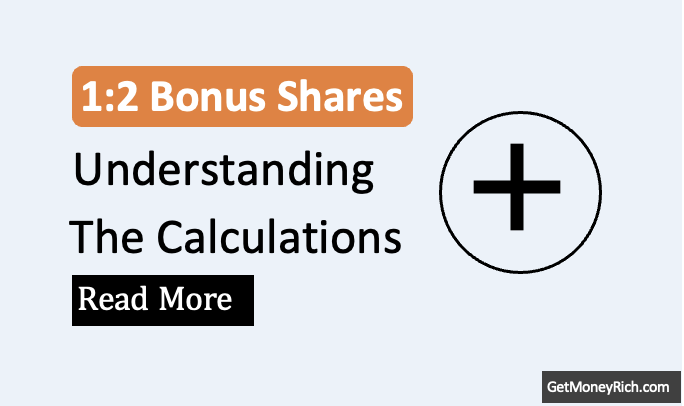Bonus Share Calculator
Calculate how many bonus shares you’ll receive based on your current shareholding and the bonus ratio (Eg, 1: 2 means 1 Bonus Share for Every Shares Held).
What is a bonus share?
A Bonus Share is an additional share given by a company to its shareholders free of cost, typically funded from the company’s reserves. For A 1: 2 Bonus Issue, You Receive 1 Additional Share for Every 2 Shares You hold.
Impact on your investment
While the number of shares increments, the share price adjusts proportional, keeping the total value of your investment the same (Excluding Market Reactions). For example, if you own 100 shares at Rs.100 each and a 1: 2 bonus is isesed, you’ll have 150 shares, but the price per share may drop to approve to approvesly Rs.66.7.
Introduction
You’ve probally heard about a company announcing a “1: 2 Bonus Share“And wonded what it means for your investments. corporate actions Can sound.
In this post, I’ll Clarify the concept of a 1: 2 bonus share, how to calcule it, and what impact it has on the investors.
But before that, a quick recap of the concept.
What Are Bonus Shares?
Bonus Shares are extra shares a company gives to its shareholders for free.
Sounds like a sweet deal, right?
But why do companies do this? Usually, they use their rights or reserves to issue these shares instead of paying cash dividends.
It’s like a company saying, “We’re Doing Well, So here’s a little gift for sticking with us. But insetad of giving direct cash (dividends) we are giving you bonus shares.,
Even in India, we see this often with companies like Reliance or Infosys when they want to reward sharehlders without speeding cash. Check Here for a list of companies Who recently Issued Bonus Shares.
A 1: 2 Bonus Share means for Every 2 Shares You own, You Get 1 Extra ShareYour Total Number of Shares Increases, but There’s also a catch,
The share price adjusts to keep the overall value of your investment the same. Confused?
Don’t worry, we’ll get to that song.
Why do companies issue bonus shares?
I Remember The First time I heard about a bonus issue from a company I investment in.
I thinkt i’d hit the jackpot.
But then I Learned It’s Not Free Money.
Companies Issue Bonus Shares for a Few Reasons,
- They might want to make their Stock more affordable For small investors. A Lower Share Price after a Bonus Issue Can Attract More Buyers. It also shows the company is confident about its future growth.
- Plus, it’s a way to Reward Loyal Shareholders Like you and me Without dipping into cash reserves,
For example, if a company’s share price is Rs.1,000, A 1: 2 Bonus Issue Might Bring it down closer to ₹ 667.
This makes the stock look more “affordable“To new investors, even thought the Total Value of the Current Investor’s Holdings Stays The Same,
How Does A 1: 2 Bonus Share Work?
Let’s get to the heart of it: What does “1: 2” actually mean? It’s a ratio.
For every 2 shares you hold, the company gives you 1 additional share. Simple, Right?
So, if you own 100 shares, you’ll get 50 more shares after a 1: 2 bonus issue. Your Total Backets 150 Shares.
But here’s the key, the price per share also also the divs after the bonus shares are issued to balance things out.
Why does the price drop?
Think of it like Cutting a pizza,
If you have 4 Slices and Add 2 More, You’ve Got 6 Slics Now, But Each Slice is Smaller. Your Total Pizza (Investment Value) is still the same size.
This price adjustments has been by the company’s overall market value does not change just because it is issued more shares.
How to Calculate Bonus Shares
Example #1: 1: 2 Bonus Issue
Let’s make this practical. Calculating Bonus Shares is Super Easy Once you get the hang of it.
Suppose you own 200 shares, and the company announs a 1: 2 bonus issue.
Here’s how you figure it out:
- Step 1: Check how many shares you haven. In this case, 200.
- Step 2: Undrstand the Bonus Ratio. For 1: 2, you get 1 bonus share for every shares.
- Step 3: Divide your shares by the denominator (2). So, 200 ÷ 2 = 100.
- Step 4: Multiply by the numerator (1). So, 100 × 1 = 100 Bonus Shares.
- Step 5: Add the bonus shares to your original shares. 200 + 100 = 300 shares.
That’s it.
You now have 300 shares.
If the share price was.600 before the bonus, it might drop to Around Rs.400 after the issue (600 ÷ 1.5, since your shares Increased by 50%).
Your Total Investment Value Remains Rs.1,20,000 (200 nos × Rs.600 = 300 nos × × Rs.400).
Example #2: 2: 3 Bonus Issue
Let’s take another example for more clarity.
Suppose You own 200 shares, and the company announs a 2: 3 bonus issue.
This means for every 3 shares you hold, you get 2 extra shares.
Here’s how you figure it out:
- Step 1: Check how many shares you haven. In this case, 200.
- Step 2: Undrstand the Bonus Ratio. For 2: 3, you get 2 bonus shares for every 3 shares.
- Step 3: Divide your shares by the denominator (3). So, 200 ÷ 3 = 66.67.
- Step 4: Multiply by the numerator (2). So, 66.67 × 2 = 133.33. Since Companies given Issue Fractional Shares, Round Down to 133 Bonus Shares.
- Step 5: Add the bonus shares to your original shares. 200 + 133 = 333 shares.
So, you now have 333 shares.
If the share price was.600 before the bonus, it might drop to Around Rs.360 after the issue (600 ÷ 1.665, Since your shares increased by about 66.5%).
Your Total Investment Value Stays at Rs.1,20,000 (200 × Rs.600 = 333 × Rs.360, Approximaately).
A Quick Note: Fractional shares aren’t isesed. For example, if you had 9 shares, you’d get (9 × 2) ÷ 3 = 6 bonus shares. With 10 shares, you’d also get 6 bonus shares, as 6.67 is rounded down. That’s just how Bonus Calculations Work!
Impact on your investment
Now, you might be wondering, “If the value stays the same, what’s the point?,
While your investment’s market value does not change mmeditely, Bonus Shares Can Still Benefit You.
For one, you now oven more shares. If the company grows and its share price rises over time, your total returns could be Higher.
Imagine if that 300 shares climb to Rs.500 each (from Rs.400), your holding is now worth Rs.1,50,000 (from Rs.1,20,000).
Also, Bonus Shares Can Make the Stock more liquidMore shares in the market mean it’s easy or sell.
But there’s a flip side. Sometimes, The Market does not react well to bonus announs I’ve seen companies who are drowning in debt, but to hide their weak fundamentals, Issuing bonus shares or giving dividends.
In My Experience, Thought, Solid Companies Like TCS or Bajaj Finance Use Bonus Issues to Signal Confidence, and The Market often Responds positively over time.
A real-life example
Let me share a real story from infosys.
Back on 2nd December 2014, Infosys Announced A 1: 1 Bonus Issue.
I Remember Folling This Closely because I had some shares in the company.
At that time, the share price was Around Rs.518.
Someone Owned 50 Shares, So His Investment Was Worth Rs.25,900.
With A 1: 1 Bonus, He Got 50 More Shares for Free, Making His Total 100 Shares. The price per share dropped to about Rs.259 after the bonus, keeping his total investment value at Rs.25,900.
Fast forward to today, infosys shares are trading at Rs.1,566.
Thos 100 Shares are now Worth Rs.1,56,600. That’s a big jump, right?
The Bonus Issue Didn Bollywood Me Rich Overnight, but it doubled his share country. Over time, as infosys grew, those extra shares boosted his returns.
This shows how Bonus Shares from a Solid Company Can Wonders If you Stay Invested.
I always keep this in mind about bonus shares
Before you get too excited about Bonus Shares, Let’s Talk about a Few Things.
- FirstCheck the company’s Financial HealthA Bonus Isue From A Strong Company is a good sign, but a weak company might just be trying to distract investors.
- Second, undersrstand the ex-bonus dateYou need to oven the shares before this date to qualify for the bonus. Miss it, and you’re out of luck.
- Also, taxes can be a factor. Bonus shares are not taxed when you receive them. But when you sell, capital gains tax applies based on the adjusted cost of acquisition.
Conclusion
I often get questions from friends about bonus shares.
One buddy asked, “Will my dividends increase due to bonus shares?” Not really. Dividends are paid per share, so if the company maintains the same total dividend payout, your per-share dividend might drop, but you’ll get it on more shares.
Another friend wondered if bonus shares dilute their stake. Nope. Your Owneship Percentage in the company stays the same.
So, there you have it, a clear picture of what a 1: 2 bonus share means and how to calculate it.
It’s not a get-rich -Quick Scheme, but it’s a Smart Way Companies Rewards Us SHARILDERS.
Next time you hear about a bonus issue, you’ll know exactly what’s happy.
Got Shares in a company announcing a bonus? Try the calculation yourself, and let me know how it goes in the comments. You can also use the Bonus Issue Calculator Above,
(Tagstotranslate) Bonus Shares (T) Infosys Bonus Share (T) Stock Market India

